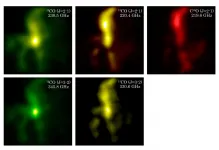(Press-News.org) You have probably often said to yourself: "This time, I will only buy what I need!" But then you still ended up coming home with things that were not on your shopping list.
How can you prevent such impulse buying? A team from the Chair of Psychology II at Julius-Maximilians-Universität (JMU) Würzburg in Bavaria, Germany, looked at this question. The answer is not that simple, says psychologist Dr Anand Krishna. It depends on what type of person you are: a pleasure-seeker or a person who focuses on security.
Anand Krishna and his JMU colleagues Sophia Ried and Marie Meixner have published their results in the open-access journal PLOS ONE.
Sometimes you buy out of curiosity, sometimes you want to indulge yourself
Sometimes you buy spontaneously, out of pure curiosity. For example, there's a treat you've never tried before. Or you want to treat yourself to something. It could be a chocolate bar, a pretty decorative piece for the living room or a great pair of jeans.
Sometimes you're really happy about the spontaneous purchase. Sometimes, you have a guilty conscience: Money is already tight! However, many people manage to suppress the impulse to reach for a chocolate bar. And they do so when they are in a situation in which they are particularly sensitive to risks.
Dr Krishna emphasises that it is not possible to say that certain customers are predisposed to impulse buying. However, the research results so far give a clue as to how people who want to protect themselves from such purchases should proceed.
How to protect yourself from impulse buying
According to the JMU psychologist, people of pleasure are spontaneous by nature. If they are feeling well and are geared to enjoyment, they will spontaneously reach for an article that promises to give them even more pleasure. At the same time, a relatively small impulse is enough for these people to stop themselves from making a spontaneous purchase: "This can be, for example, a small note in the wallet that says 'Stop!' or something similar," says Krishna.
Then there are the security-oriented people. For them, a warning note in the wallet alone would not help. Security people need time. And in general: even impulse buying does not happen so quickly with them. "Does this really taste as good as it looks?" Such thoughts may go through their minds at the sight of a fine chocolate. They also need more time to say "No!" to the treat. It seems to help them more if they look more often at a note saying "No impulse buying today!" when walking through the shop.
Security people take a tad longer
The research results are interesting especially since one might actually think that security-oriented people are generally more likely to avoid impulse purchases. But this is not the case. If they are in a positive motivational state, they are just as tempted to treat themselves to something good as pleasure-seekers. The big difference is that no matter what they end up doing, it takes them a tad longer cognitively to act.
These findings arose from a laboratory study with around 250 participants. Two experiments were conducted.
The results are interesting for marketing, but also for consumer protection. "The latter because impulse buying can be a problematic and undesirable behaviour for many people," says Anand Krishna. To help, it is important to know that there are two types of people, that different cognitive processes necessitate different methods to prevent impulse buying, and most importantly, that the current situation plays a big role.
Motivational state plays an important role
They have honestly earned the reward in the form of a new pair of jeans, the pleasure-seeker thinks - and buys spontaneously, following what is called in psychology a promotion focus. "Let's say they had ice cream shortly before, so they're attending to rewards and pleasure anyway, and use the chance to get even more pleasure," explains the JMU researcher.
The situation is different if the pleasure-seeker has just come from a conversation at their bank. Despite their basic orientation towards pleasure, the risks of spending too much money are active in their mind. They suppress their impulse and walk past the great pair of jeans, even without much time for reflection.
Goods that certain customers might gladly buy on one day are therefore left behind on another. This is what the results from the Würzburg psychology department suggest. And this is independent of how they are presented. Because it seems to depend on the emotional state in which the customers enter the shop.
The question of what security-oriented customers do when they have to act under time pressure is still open. For example, if they don't want to buy the chocolate bar because they stood on the scales in the morning and they showed two kilos too much. Maybe they still reach for the candy when they have to hurry to the checkout, because there is not enough time to reflect. But more experiments are needed to clarify this.
INFORMATION:
The two major challenges in industrial enzymatic catalysis are the limited number of chemical reaction types that are catalyzed by enzymes and the instability of enzymes under harsh conditions in industrial catalysis. Expanding enzyme catalysis to a larger substrate scope and greater variety of chemical reactions and tuning the microenvironment surrounding enzyme molecules to achieve high enzyme performance are urgently needed.
Recently, a research team led by Prof. Jun Ge from Tsinghua University, China reviewed their efforts using the de novo approach to synthesize hybrid enzyme catalysts that can address these two challenges and the structure-function relationship is discussed to reveal ...
A research team at the University of Córdoba has developed and evaluated models for the prediction of solar radiation in nine locations in southern Spain and North Carolina (USA).
Measuring solar radiation is costly, as are all the tasks related to the maintenance and calibration of the most commonly used sensors: pyranometers and radiometers. The result is a paucity of reliable data. Hence, a research group from the University of Córdoba has developed and evaluated several Machine Learning models to predict solar radiation in nine locations (southern Spain and North Carolina, USA) spanning a range of different geo-climatic conditions ...
Washington, DC, July 8, 2021 - A study in the Journal of the American Academy of Child and Adolescent Psychiatry (JAACAP), published by Elsevier, reports that the type of one-on-one treatment plans delivered to toddlers, aged 12-30 months, diagnosed with autism spectrum disorder (ASD) did not lead to any significantly different outcomes. Neither the type of evidence-based intervention provided, nor the number of hours of therapy were shown to have an impact.
The treatments, or intervention methods, delivered by specialized staff to the very young, during the study were either the Early ...
Of the Swedish men in their late teens who performed well in the physical fitness tests for military conscription, a relatively high proportion were able to avoid hospital care when they became infected with COVID-19 during the pandemic up to 50 years later. This has been shown by University of Gothenburg researchers in a register study, with results now published in the BMJ Open.
The study is based on the Swedish Conscription Register, which contains particulars of over 1.5 million young Swedish men who began their military service in the years 1969-2005. Almost all of these men then underwent both a bicycle test and a strength test. Some 2,500 of the men included in the Conscription Register were later, in spring 2020, hospitalized with COVID-19.
For their study, the scientists ...
A research study from the The Lundbeck Foundation Initiative for Integrative Psychiatric Research iPSYCH shows that people with ADHD, who also have another psychiatric diagnosis, are more likely to stop taking their ADHD medicine.
ADHD is one of the most common psychiatric disorders in childhood and is commonly treated with medication. ADHD medicine can be divided into two groups: medicine that has a stimulating effect - also known as stimulants - and non-stimulants, which are often used if a person does not respond well to the other form of medicine.
The medication can be an effective way of reducing symptoms, by ...
Researchers have used the latest wireless technology to develop a new radio receiver for astronomy. The receiver is capable of capturing radio waves at frequencies over a range several times wider than conventional ones, and can detect radio waves emitted by many types of molecules in space at once. This is expected to enable significant progresses in the study of the evolution of the Universe and the mechanisms of star and planet formation.
Interstellar molecular clouds of gas and dust provide the material for stars and planets. Each type of molecule emits radio waves at characteristic frequencies and astronomers have detected emissions from various molecules ...
(Boston)--As analytical instrumentation (gas- and liquid-chromatographs coupled with mass spectrometers) increase in sensitivity and speed, forensic scientists may find themselves still hindered by the process of preparing samples (blood, urine, etc.) for analysis and seeking more efficient approaches.
In an article in WIRES Forensic Science, researchers from Boston University School of Medicine's (BUSM) Biomedical Forensic Sciences program, provide an overview of sample preparation techniques and information on routine sample types that may be encountered in forensic toxicology cases.
Forensic toxicology encompasses a large variety of scenarios including drug-facilitated crimes, understanding ...
A new UBC Sauder School of Business study shows that depending on how employees understand their boss' motivation, employees can feel anger or guilt, and consequently, react differently to abusive supervision.
Former Apple CEO Steve Jobs was a famously harsh corporate leader, one who pushed his employees to extremes to achieve the company's lofty aims.
But while many aspiring leaders still believe that the "tough love" approach is effective, a new study from UBC Sauder shows that, even when abusive leadership is meant to push employees to new heights, it can land them in deep lows in the long term.
Abusive supervision -- which includes behaviours like yelling at employees, giving them the silent treatment, or putting them down in front of their ...
More than a third of coal miners and former coal miners suffering from black lung disease struggle with depression, and more than one in 10 has recently considered suicide, a new study finds.
The study is believed to be the first to examine mental-health issues in a large population of coal miners in the United States. Based on the troubling results, the researchers are calling for more mental health resources and treatment for current and former miners. They also are urging further study of potential contributors to the problem, including social determinants of health, ...
Evidence from an ancient eggshell has revealed important new information about the extreme climate change faced by human early ancestors.
The research shows parts of the interior of South Africa that today are dry and sparsely populated, were once wetland and grassland 250,000 to 350,000 years ago, at a key time in human evolution.
Philip Kiberd and Dr Alex Pryor, from the University of Exeter, studied isotopes and the amino acid from ostrich eggshell fragments excavated at the early middle Stone Age site of Bundu Farm, in the upper Karoo region ...




